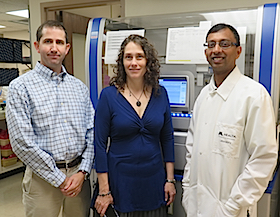Genomics is Transforming Cancer Diagnosis
August 2016

Genomics is helping to transform how cancer is characterized, enabling physicians to select treatments that improve chances of survival and reduce exposure to harmful side effects.
The University's Molecular Diagnostic Laboratory (MDL) is at the forefront of the clinical genomics revolution. MDL medical director Bharat Thyagarajan says the laboratory focuses on "a narrow set of genes that have been shown to have established clinical relevance." A clinical pathologist in the Department of Laboratory Medicine and Pathology, Thyagarajan expects MDL's current panel of 21 genes in cancer diagnosis to be expanded to a menu of approximately 150 genes distributed across several cancer specific panels within the next six months. "All the action is being directed toward predictive biomarkers, which can influence how the patient is treated," Thyagarajan says.
What's driving genomics within pathology is the growing demand for more types of molecular-based genomic analyses on specimens and the increased integration of diagnostic technologies. There's an ongoing effort under Thyagarajan, anatomic pathologist Andrew Nelson, hematologist Sophia Yohe and others involved in the department's molecular pathology and genomics initiative to join molecular genetics with cytogenetics and results from flow cytometry and clinical chemistry to get a more complete picture of tumor behavior. Interpretation remains key.
"The problem that I see routinely is people misunderstanding technological capabilities for clinical interpretive capabilities," Nelson says. "Our ability to interpret the ever-increasing onslaught of data in a clinically meaningful way to predict how the disease will behave is a challenge." One of the ways the challenge can be met is through sound data curation and data sharing by clinical consortia in the U.S. and around the world, Nelson says.
MDL has achieved a major success in its ability to test successfully nearly all cancer specimens it analyzes. More than 98 percent of tested specimens yield clinically useful information, Thyagarajan says, a higher rate than other academic clinical laboratories. MDL has optimized procedures in a way that allows it to use minimal amounts of tissue to obtain clinically relevant mutation information. Relevant DNA sequence and mutation information, say from the MDL lung cancer panel, is then integrated with results from cytogenetics using fluorescent in-situ hybridization or FISH. Thyagarajan believes community pathologists can benefit from MDL cancer genomics because of it
- Uses of minimal amounts of tissue
- Provides integrated diagnostic reports
- Provides expanding gene panels, and
- Has the ability to detect low-level mutations
In advancing the use of genomics for diagnosing cancer, MDL plans to make the analysis of cell-free DNA, for example from blood plasma, available in the near future. MDL's advanced bioinformatics capabilities help make this possible and also contribute to its ability to detect minimal residual disease, a critical factor for many patients being treated for cancer, especially those with leukemia.
Our molecular pathologists are happy to consult on cases you have or help you in assessing genomic approaches that might be utilized.